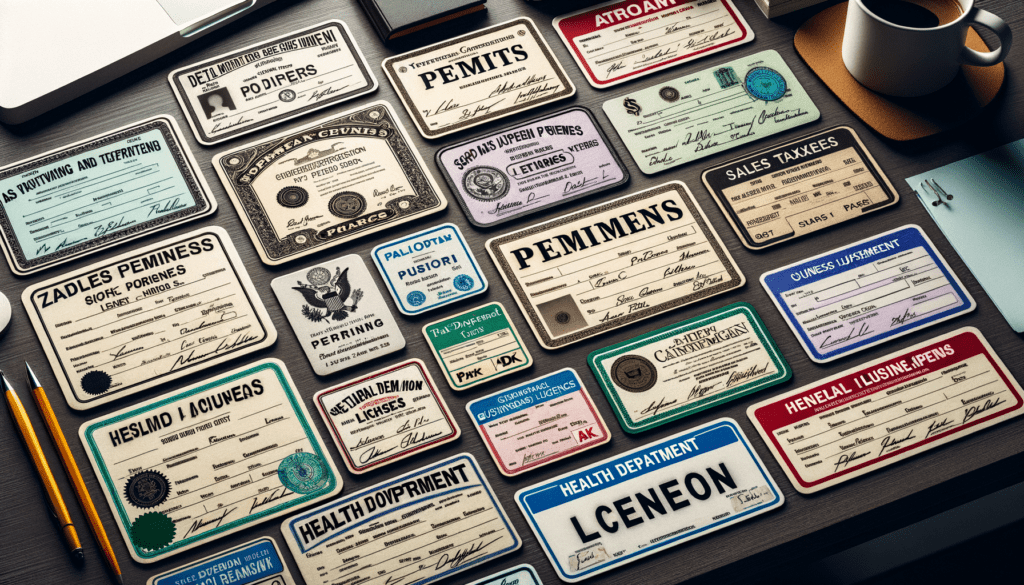Launching a startup is an exciting endeavor, yet it comes with a host of responsibilities, particularly when it comes to legal compliance. Navigating the intricate landscape of permits and licenses is critical for ensuring smooth operations and avoiding potential legal pitfalls. Without the proper documentation, businesses risk fines, legal action, and even closure. This guide will assist you in identifying the essential permits and licenses needed for your startup journey.
1. Business Structure Decisions
Your business structure affects your taxes and liability and determines the types of permits and licenses you will need. It’s crucial to understand the requirements for each entity type:
1.1 Sole Proprietorships
Sole proprietorships are the simplest business structures, typically requiring only a local business license. However, you should check:
- Local zoning laws.
- Any necessary trade licenses specific to your industry.
1.2 Partnerships
Partnerships often require a partnership agreement, outlining the roles and responsibilities of each partner. Additionally, you’ll need to register your partnership with the state, which may involve obtaining:
- Business licenses.
- Any industry-specific permits.
1.3 Limited Liability Companies (LLC)
Forming an LLC typically involves filing Articles of Organization with the state. Depending on your business’s nature, you may also need various permits, such as:
- Operating permits.
- Health and safety licenses.
1.4 Corporations
Corporations necessitate more rigorous documentation. You’ll need:
- Articles of Incorporation.
- Bylaws to govern your organization.
- State and possibly federal licenses.
2. Industry-Specific Licenses
Each industry has unique licensing requirements. Ensure you thoroughly investigate what’s necessary to operate legally in your field:
2.1 Retail and E-commerce
To sell goods, whether online or in a physical store, you typically need:
- Sales tax permits.
- Resale licenses.
2.2 Food and Beverage
In the food industry, compliance is paramount. You’ll need:
- Health permits.
- Food service licenses.
- Food handler certifications.
2.3 Technology and SaaS
For tech startups, licensing may include:
- Data protection licenses.
- Software licenses specific to your platform.
2.4 Healthcare and Pharmaceuticals
Medical startups require specialized licenses to comply with health regulations. Be sure to secure:
- Medical licenses.
- Pharmaceutical licenses.
3. Operational Permits
Operational permits are necessary for running day-to-day business activities legally:
3.1 Zoning Permits
Before selecting a physical location, understand zoning laws that dictate where certain businesses can operate.
3.2 Home-Based Business Permits
If you plan to run your startup from home, check local regulations that might require:
- A home occupation permit.
3.3 Environmental Licenses
Businesses that impact the environment may require specific licenses to minimize their footprint.
3.4 Signage Permits
Don’t overlook the rules regarding signage. Many municipalities require permits for:
- Outdoor advertisements.
- Business signage.
4. General Business Licenses
Regardless of your industry, general business licenses are often required at various government levels:
4.1 Federal Licenses
Some businesses, like those involved in aviation or agriculture, require federal licenses. Determine if your operations necessitate federal oversight.
4.2 State Licenses
Each state has unique licensing requirements. Research to understand what your state mandates.
4.3 Local and City Licenses
Local requirements often include business permits, sales tax licenses, and other industry-specific licenses. Contact your local government for details.
5. Professional and Occupational Permits
Certain professions demand special licenses. If your startup falls into these categories, pay close attention to these requirements:
5.1 Licensing for Regulated Professions
Fields like law, medicine, and accounting often require professional licenses. Make sure to obtain:
- State licensure.
- Board certifications.
5.2 Continuing Education and Renewals
Many professional licenses require ongoing education for renewal. Keep abreast of renewal dates and educational requirements.
6. Key Requirements for All Startups
Starting a business involves navigating a complex landscape of legal permits and licenses. Here’s a comprehensive overview of the key requirements:
6.1 Business Licenses and Permits
Local, State, and Federal Levels
- Local Business Licenses: These ensure compliance with municipal regulations. For example, businesses involving food or alcohol services require specific permits. A general business license grants the right to conduct business within a specific area and helps avoid fines.
- State Business Licenses: Many states require specific licenses, especially for industries like construction and pet care. These licenses can be general or industry-specific, such as the Arizona State Board of Cosmetology license for hairstylists.
- Federal Licenses: Only certain businesses, typically in highly regulated industries like agriculture, aviation, and firearms manufacturing, need federal licenses. Operating without the necessary federal licenses can result in significant fines and penalties.
6.2 Employer Identification Number (EIN)
An EIN is a unique federal tax identification number required for tax purposes. It is essential if you have employees, operate as a corporation or partnership, or file specific tax returns.
6.3 Intellectual Property (IP) Protection
If your product or service has intellectual property that needs protection, consider applying for patents, trademarks, copyrights, trade secrets, industrial designs, and geographical indications.
6.4 Regulatory Compliance Automation
Automating regulatory compliance processes can significantly reduce the risk of non-compliance, improve efficiency, and enhance visibility and reporting. This is particularly crucial for businesses in highly regulated industries, such as those handling sensitive customer data.
Steps to Obtain Licenses and Permits
- Determine Necessary Licenses: Identify the licenses required based on your business activities and location. Check with state and local government offices to determine the necessary licenses and permits.
- Research State Licensing Requirements: Visit your state’s government website or use resources like the SBA’s locator to find business license requirements for your state.
- Check Local Licensing Requirements: Thoroughly investigate and comply with local licensing regulations, which can differ significantly from state and federal requirements. Consult your local city hall or courthouse to determine the necessary licenses and permits for your business location and activities.
- Apply for Licenses: Apply for the necessary licenses early, ideally before starting operations.
Conclusion
Securing the correct permits and licenses is not only essential for staying compliant but also critical for the overall success of your startup. Taking the time to understand your requirements will pay off as you grow your business without legal complications. By starting your journey toward compliance, you’ll create a solid foundation for your startup.





